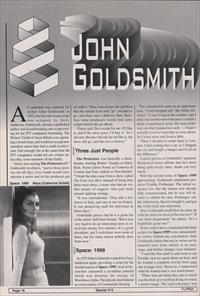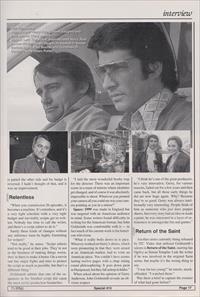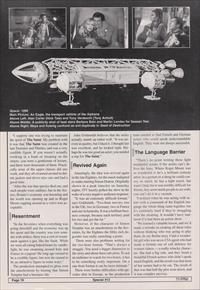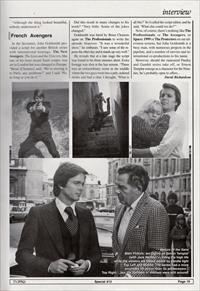John Goldsmith interview
TV ZONE SPECIAL Number 13, ITC Special (June 1994); p16-19. TV Zone




An ambition was realized for writer John Goldsmith in 1972; his first television script was accepted, by Gerry Anderson. Goldsmith, already a published author, had found breaking into script writing for the ITV companies frustrating. The Writers' Guild of Great Britain was operating a closed shop, and would not accept new members unless they had a credit in television. Fair enough, but at the same time the ITV companies would not use writers unless they were members of the Guild...
"Gerry was starting The Protectors off," Goldsmith recollects, "and in those glorious far-off days, Lew Grade would commission a series and let the producers get on with it. There was always the problem that the minute Lew said 'go' you had to go, and there was a delivery date, therefore some producers would risk some scripts before the go-ahead.
"Gerry said 'Do a script for me. If I like it, and if the show goes, I'll buy it.' So I did one [Brother Hood], he did like it, the show did go, and the rest is history."
The Protectors was basically a three-hander, starring Robert Vaughn as Harry Rule, Nyree Dawn Porter as Contessa di Contini and Tony Anholt as Paul Buchet. "I think the idea came from a show called The Four Just Men. Instead of being four there were three, a team who had no visible means of support, who just went around righting wrongs.
"It was international. They did a few shows in Italy, and one or two in France. It was pioneering stuff for television in those days." of the series' half-hour format. "But it was very hard to do an interesting story in effectively twenty five minutes. It's a good discipline, and I wish there were more of them, but for some reason nobody does them now."
In 1975 John Goldsmith worked for Gerry Anderson again, providing a script for the second season of Space: 1999. Seed of Destruction concerned a crystalline asteroid which was draining the energy of Moonbase Alpha. The episode also featured an exact replica of Commander Koenig.
The commission came at an opportune time. "I had dropped out," the writer discloses. "I was living in the country, and I didn't do another novel because I couldn't think of anything to write. My basic problem was that I peaked too early - I hadn't actually lived so I had little to write about. So I went away and lived a little.
"Then I decided to come back to London. I had nothing but a car, so I flogged the car and bought a banger and lived on the difference."
A quick glance at Goldsmith's spacious Hampstead house affirms that he's been doing quite nicely since, thank you very much.
With the second series of Space: 1999 approaching, Goldsmith telephoned producer Freddie Freiberger. The initial response was that the season was already fully commissioned, but he was still invited to submit his idea. Freiberger saw the submission, liked it, bought it, and got the writer back into television.
Does Goldsmith recall how he came up with the ideas for Seed of Destruction? "It was sheer desperation," he admits. "It's a frightfully good one!"
Some writers have complained that their scripts for Space: 1999 were substantially re-written without any consultation. John Goldsmith claims that any re-writes on his material were done mainly at an early stage, and further changes were minimal. "I sent the first draft in and went to see Freddie, and we spent about an hour, and he wanted a complete rewrite from page one to page sixty. However, I understood what he wanted and it was much better. "There was one thing they put in which was the trick of everything being reversed, a mirror image. The replica Koenig's hair is parted the other side and his badge is reversed. I hadn't thought of that, and it was an improvement.
"When you commission 26 episodes, it becomes a machine. It's relentless, and it's a very tight schedule with a very tight budget and inevitably scripts get re-written. Nobody has time to call the writer, and there's a script editor to do it." Surely these kinds of changes without any reference must be highly frustrating for writers?
"Not really," he states. "Script editors tend to be good at their jobs. They're not in the business of making things worse, they're there to make it better. On a movie one has major fights and tries to protect the script as much as possible, but that's a different thing."
Goldsmith admits that one of the sequences in his finished script did cause the most awful production headaches.
"I laid the most wonderful booby trap for the director. There was an important scene in a maze of mirrors where identities get changed, and of course it was absolutely impossible to shoot. Wherever you pointed your camera all you could see was your camera pointing at you in a mirror!"
Space: 1999 was made in England but was targeted with an American audience in mind. Some writers found difficulty in writing for the American format, but John Goldsmith was comfortable with it - in fact much of his current work is for American television. "What it really boils down to is pace. Whoever worked on Gerry's shows, which were pioneering in that they were aimed at an American market, had to write an American piece. You couldn't have scenes lasting twelve pages with a chap sitting round philosophizing. It goes down great in Hampstead, but they fall asleep in Idaho." When asked about his opinion of Gerry Anderson, John Goldsmith reveals an obvious respect. "I think he's one of the great producers, he's very innovative. Gerry, for various reasons, faded out for a few years and then came back, but all those early things he did are now huge again. Why? Because they're so good. Gerry was always intellectually very interesting. People think of him as someone who just does puppet shows, but every story had an idea or made a point; he was interested in a layer of seriousness in amongst the fun and games."
Another series currently being released by ITC Video that utilized Goldsmith's talents is Return of the Saint, starring Ian Ogilvy as Simon Templar. I ask the writer if he was involved in the original Saint series, but maybe it's the wrong thing to say.
"I was far too young!" he retorts, mock offended. "I watched them."
Was there a brief to capture the essence of what had gone before?
"I suppose one was trying to maintain the spirit of The Saint. My problem with it was that The Saint was created in the late Twenties and Thirties, and was a very credible figure. If you weren't actually working in a bank or sleeping on the streets, you were a gentleman of leisure, and there were thousands of them. Practically none of the upper classes did any work, and they all swanned around in dinner jackets and drove nice cars and had a good time.
"After the war that species died out, and such people were oddities, but in the Sixties, Britain's economy was booming and the world was opening up and so Roger Moore zapping around in a volvo was acceptable.
"In the Seventies when everything was going downhill and the economy was up the spout and the country was torn asunder with strikes, there was a sort of resentment against a guy like the Saint. While we were all eating baked beans by candlelight, he was swanning around Italy and France in a jaguar! He long ago ceased to be a credible figure, but now he ceased to be an attractive figure in some ways." The production attempted to gloss over the anachronism by hinting that Simon Templar had a business life.
John Goldsmith believes that the series actually stands up rather well. "It was uneven in quality, but I liked it. I thought Ian was excellent, and he looked right. Perhaps he was too good an actor; you needed a star for The Saint."
Amazingly, the idea was revived again in the late Eighties, for the much maligned re-make starring Simon Dutton. Originally shown in a peak timeslot on Saturday nights, ITV hastily pulled the show in the wake of a very negative audience response. "It was an extremely difficult format," says Goldsmith. "Two-hour movies; two in the UK, two in Germany, two in France and one in Australia. It was a brilliant business concept, because each territory paid for two and got the lot."
However, if the character of Simon Templar was an anachronism in the Seventies, by the Eighties the filthy-rich do-gooder was really stretching a point. There were also problems writing for the two-hour format. "That's always a struggle. You need a bigger dimension to the story and about three sub-plots. To ask an audience to watch for two hours, it has to be something really important. On a one-hour format it can be more intimate." There were further difficulties with episodes shot in Europe, as the production team needed to find French and German actors who could speak understandable English. They were not always successful.
"There's no point writing these light wonderful scenes if the actors can't deliver the lines. Where Roger Moore was so wonderful is he's a brilliant comedy artist; in a gesture or a shrug he could convey so much, he has a light touch. Ian wasn't bad, but it was terribly difficult for Simon. Any actor needs people to act with; you can't do it in a vacuum.
"I noticed when he was acting with actors with a command of the English language the whole thing came together, but it's extremely hard if they're struggling with the meaning. It wouldn't have mattered if it had been an action show. "We learned a valuable lesson, and we'd made a mistake in creating all these roles without thinking who was going to play them. In my Berlin story I had a wonderful girl who was an ex-CIA agent who had made a fortune out of self defence for women videos - a really whacky character. She had a big role, and they hired a beautiful French actress who didn't speak much English, and the result was that most of her scenes had to be cut. The result of that was that half the plot went down, and it was complex anyway.
"Although the thing looked beautiful, nobody understood it."
In the Seventies, John Goldsmith provided a script for another British series with international leanings, The New Avengers. The Lion and the Unicorn, like one of his most recent Saint scripts, was set in London but was changed to Europe. "Brain [Clemens] said 'We're moving it to Paris, any problems?' and I said 'No, so long as you do it'."
Did this result in many changes to his work? "Very little. Some of the jokes changed."
Goldsmith was hired by Brian Clemens again on The Professionals to write the episode Stopover. "It was a wonderful show," he enthuses. "I saw some of the repeals the other day and it stands up very well." He reveals that at a late stage the script was found to be three minutes short. Extra shot at the last minute. "There extraordinary scene in the middle where the two guys went into a pub, ordered drinks and had a chat. I thought, 'What is all this?' So I called the script editor, and he said, 'What else could we do?'"
Now, of course, there's nothing like The Professionals, or The Avengers, or Space: 1999 or The Protectors on our television screens, but John Goldsmith is a busy man, with numerous projects in the pipeline, and a number of movies and international co-productions to his name. However, should the rumoured Purdey and Gambit series take off, or Simon Templar emerge as a character for the Nineties, he's probably open to offers...
David Richardson